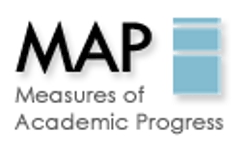Measures of Academic Progress® (MAP®) are K – 12 interim assessments that measure growth, project proficiency on high-stakes tests, and inform how educators differentiate instruction, evaluate programs, and structure curriculum.
Computer-adaptive MAP assessments reveal precisely which academic skills and concepts the learner has acquired and what they’re ready to learn. MAP assessments are grade independent and adapt to each learner’s instructional level. Every item on a MAP assessment is anchored to a vertically aligned equal interval scale, called the RIT scale for Rasch UnIT-a stable measurement, like inches on a ruler, that covers all grades.
And because the measurement is reliable and accurate, RIT scores serve as an essential data point in a learner’s ILP; facilitators can see their precise learning level and respond accordingly.
Our facilitators rely on MAP to provide essential information about their learners’ continuum of learning and promote a positive growth trajectory. Unlike other standardized tests, MAP is a tool to help learners, parents, and facilitators identify strengths and opportunities, and to focus instruction on the areas of greatest need.

